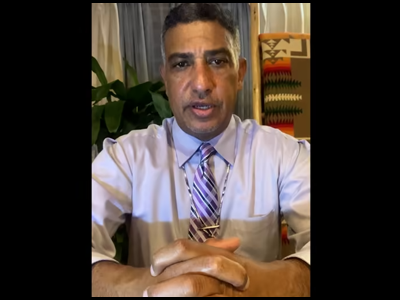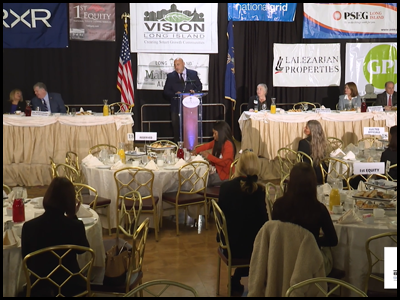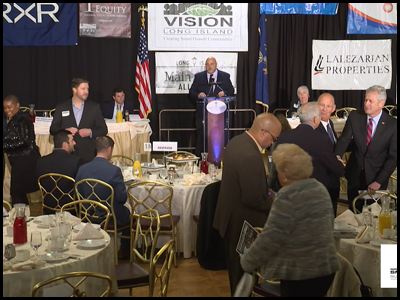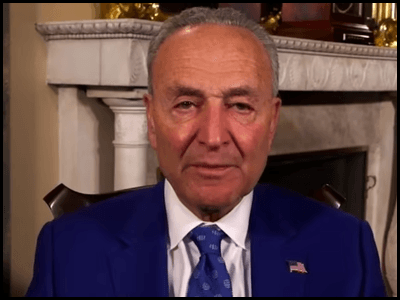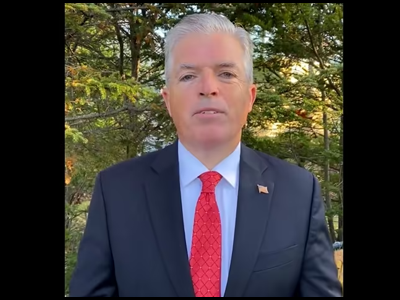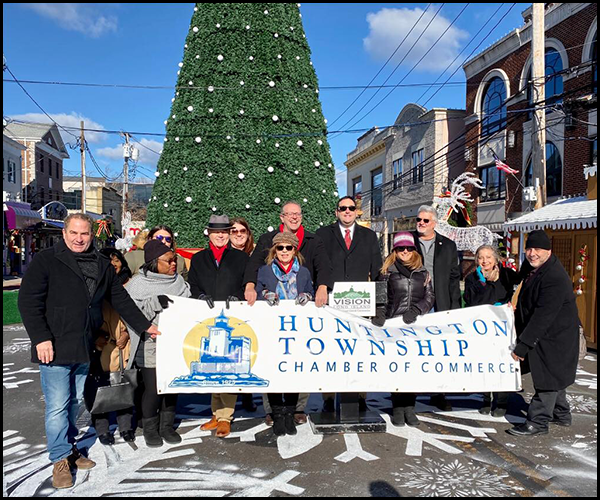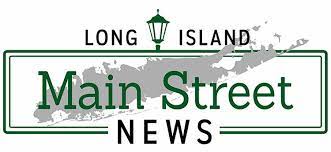
presented by Vision Long Island and the Long Island Main Street Alliance
20th Annual Long Island Smart Growth Summit Preview

The 20th Annual LI Smart Growth Summit brought together nearly 150 speakers in thirty sessions, with over fifty elected officials, twenty development and infrastructure presentations and more than 1,000 participants.
The three-day summit, running November 17th through the 19th, consisted of two virtual days and one in person event at the Crest Hollow Country Club in Woodbury. The summit focused on helping small businesses recover from COVID-19, supporting downtown revitalization, investing in infrastructure, economic development and much more.
“This year’s summit brought together folks of all backgrounds, politics, economics, races and cultures to raise up local voices in the support and planning of Long Island downtowns,” explained Eric Alexander, Director of Vision Long Island and the Long Island Main Street Alliance. “This successful bottom-up approach should send a clear national message on how to work together in a climate of chaos and division.”
The summit’s traditional State of the Towns and Villages Plenary Session brought to the dais, at the Crest Hollow Country Club on day three, elected officials from all across Long Island. “The Summit has always been about collaboration,” opened Eric Alexander, Director of Vision Long Island and the Long Island Main Street Alliance. “It is more important now more than ever. We have to listen - a lot.”
Newsday’s Joye Brown quickly drilled down on arguably one of the most important issues facing local towns and villages right now. “The pandemic has left a lot of people scrambling for rent, and a lot of people scrambling for mortgage payments. What, if anything, can our elected officials do to make things smoother for those in the market for affordable housing?”

Babylon Town Supervisor Rich Schaffer responded that towns need to take the lead. “In the Town of Babylon, we welcome the opportunity to have redevelopment. Our goal is to take existing properties and turn them into more productive properties… including affordable rental housing.”
Islip Town Supervisor Angie Carpenter commented, “In terms of affordable housing, in Central Islip we were the recipient of the third round of the Governor’s DRI funding… At the north end of the project, we did an RFP and that is going to be 100% affordable housing, mixed use, with retail. There are other such projects moving forward as well.”
Brookhaven Town Supervisor Ed Romaine stated, “We are moving to change the face of Brookhaven and renew it. We have overlay districts where we are talking about and creating affordable housing,” such as in East Patchogue, Yaphank, Ronkonkoma, Port Jefferson Station, Setauket, Farmingville, Middle Island, and Coram.
North Hempstead Town Supervisor-Elect Jennifer DeSena noted, “We definitely need affordable housing in North Hempstead. We are on the side where we don’t have new space to develop. We are going to have to redevelop old spaces.”

Riverhead Town Supervisor Yvette Aguiar stated, “Riverhead is being regentrified at the current time. We do have plenty of affordable housing. We are also focusing on moderately priced homes.”
Village of Hempstead Deputy Mayor Jeffrey Daniels responded, “We believe in affordable housing, but we have a lot of affordable housing. We have a lot of workforce housing existing in the Village of Hempstead. We need market rate housing. We are a picture of a TOD already. We have a financially structural problem in the Village.”
Southampton Town Supervisor Jay Schneiderman retorted, “The Hamptons have never been synonymous with affordable housing. During the pandemic, [housing] prices went through the roof. When you talk about creating affordability, it is a very complex situation. It is always met with litigation; it is always a challenge. We do try to power through it. We are trying to make more affordability happen. We changed our zoning, passed local laws, and are working on an affordable housing plan.”
Village of Westbury Mayor Peter Cavallaro detailed, “The only governments that can incentivize or encourage affordable housing are villages and towns. It will not just happen on its own, you have to incentivize it. Municipalities can create zoning that incentivizes it. Westbury has done just that. We encourage housing at every price point.”
Village of Lindenhurst Deputy Mayor Michael Lavorata explained, “We are trying to cater to the young folks. We are trying to keep our kids here. We don’t want them moving out of state.”
In a video message, Randy King, Vice Chairman, Shinnecock Indian Nation Council of Trustees, focused on the Shinnecock point of view of the COVID response, smart community planning and economic growth. Regarding the latter, Mr. King keyed in on the benefits of creating a modest gaming facility on Montauk Highway in Southampton, emphasizing it would act as an economic engine for the area. “It is time for equity,” Mr. King concluded.
You can view Mr. King’s video here.
The panelists also discussed their priorities for the bipartisan $1 trillion infrastructure funds coming from the federal government, which included sewers and roads, and what strategies the panelists use to instill trust with the community, which included communication and transparency.
You can view the entire State of the Towns and Villages Plenary Session here.
Featured Speakers, focusing on Bringing Resources to Our Communities, included Matthew Cohen, president of the Long Island Association, Suffolk County Legislator Presiding Officer- Elect Kevin McCaffrey, Nassau County Legislator Presiding Officer Richard Nicolello, Nassau County Comptroller-Elect Elaine Phillips New York State Senator Mario Mattera, New York State Senator Phil Boyle, and New York State Senator Alexis Weik. Each speaker discussed the need to rise above party politics and engage whole communities in order to really make positive changes on the local level.

LIA’s Matt Cohen stated, “We want to be inclusive. The more we do together, the better things will be. We have to collaborate” especially in terms of affordability, small businesses, and diversity, equity and inclusion.
Presiding Officer-Elect Kevin McCaffrey opined that we must use everything learned in local government to “benefit everyone in the county from a bottom-up perspective as opposed to edicts coming from high above.” Legislator Presiding Officer Richard Nicolello added, “The boundaries between Nassau County and Suffolk County are really artificial. For the most part, we have regional issues.” Nassau County Comptroller-Elect Elaine Phillips noted the best way of understanding government is by being in local government, “you just can’t hide.”
Senator Mario Mattera stated, “It is important to reach out to your civics, your chambers, your fire departments. You must get the community involved in local projects.” Senator Phil Boyle, discussing the success of communities such as Patchogue, encouraged the attendees “to get together and work with our communities.” Finally, Senator Alexis Weik concurred, “It is so important for everyone to have conversations together, in the same place, at the same time. This is how you get everyone on the same track.”
You can view the entire Featured Speakers panel video here.
A recent Long Island Main Street News interview, featuring Newsday’s business and economic journalist James Madore, served as the opening keynote address. Focusing on the recent plight of Long Island’s small business community and the role and effectiveness of government aid programs connecting to and aiding local downtowns, Mr. Madore shared what he sees and hears each day. “Small businesses are still struggling, the pandemic is still with us,” Mr. Madore advised. “Although things are better, we still have a long way to go.” Referring to the trouble in finding employees and the rising prices of goods, Mr. Madore explained, it will take several years for small businesses to fully recover.
You can view Mr. Madore’s full interview here.
U.S. Senator Chuck Schumer, in a video message to attendees, spoke about the difficulties Long Island communities and businesses have faced these past twenty months. Citing the Payroll Protection Program, the Save Our Stages Program, the procurement of 265 million dollars in restaurant relief, 320 million dollars to Long Island school districts, and nearly a billion dollars of direct flexible aid to Nassau and Suffolk Counties, Senator Schumer noted these steps have and will continue to improve our communities. Referring to the recently passed $1 trillion bipartisan infrastructure bill, Senator Schumer stated, “We must continue to make big and bold investments to power Long Island’s recovery.”
You can view Senator Schumer’s message here.
Suffolk County Executive Steve Bellone, joining the summit virtually, discussed the County’s efforts to combat issues that have long plagued the region. “We have prioritized issues like affordable housing, water quality, transportation and infrastructure,” the County Executive stated. By investing in communities, economic growth and the future, we are building back stronger than ever before, the County Executive noted.
You can view County Executive Bellone’s message here.
Stay tuned for a full and complete write up on the 20th Long Island Smart Growth Summit, coming soon!
LONG ISLAND MAIN STREET NEWS
Subscribe to KEEP UP WITH
VISION Long Island
VISION LONG ISLAND NEWSLETTER
Thanks for subscribing to the VISION LONG ISLAND newsletter.
Please try again later.
All Rights Reserved | Vision Long Island
Site by TiedIn Media

